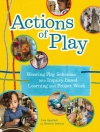’This volume is exemplary in synthesizing research and condensing pertinent data on early childhood services both for practitioners and policymakers.’
-Charles Bruner, Director, Child and Family Policy Center
’Any school district struggling with low test scores, high mobility, and/or high poverty should consider the benefits of early intervention-and read this book.’
-Mathieu Aubuchon, Preschool Coordinator The Early Childhood Center at Gregory Hill, Westminster, CO
Your research-based reference for developing quality early educational experiences!
School and district administrators, as well as policymakers, are increasingly recognizing that early education and intervention services for young children have a direct and positive impact on later school performance and quality of life. But which programs and services should be operated and funded? To answer that question, this book highlights the principles that characterize effective practices and programs for children ages 3-8.
Written specifically for busy administrators, Evidence-Based Practices and Programs for Early Childhood Care and Education synthesizes what works, what doesn′t, and what we still need to know based on the reviews of scientific literature by an expert panel of contributors. Key topics include:
- Definition and assessment of readiness of children and schools
- Early intervention for children in poverty, English language learners, and students with special needs
- Publicly funded, home-based, school-age, and out-of-schooltime programs
- The future of personnel preparation and professional development
The result is a highly readable presentation of the evidence needed to make informed practice, program, and policy decisions in early care and education.
Innehållsförteckning
Acknowledgments
About the Editors
About the Contributors
Introduction
Part I. Evidence-Based Practices
1. School Readiness: Definitions, Best Practices, Assessments, and Cost – Kelly E. Mehaffie and Jeffery Fraser
The Importance of Early Learning
Definitions of School Readiness
The Intersection of Readiness Factors
Research Informing School Readiness Factors
Assessing Readiness
Costs and Savings of Being Ready for School
Conclusions and Recommendations
References
2. Early Intervention Practices for Children With and At Risk for Delays – Louise Kaczmarek and Christina J. Groark
Children At Risk for Delay Due to Poverty
English Language Learners At Risk for Delay
Children With Developmental Disabilities and Delays
Conclusions and Recommendations
References
3. Best Practices for Transitions Into Kindergarten – Kelly E. Mehaffie and Mary Wolfson
Transitions in Context
Best Practices for Transitions
Conclusions and Recommendations
References
Part II. Evidence-Based Programs
4. Publicly Funded Programs and Their Benefits for Children – Wendy M. Barnard
Federal Programs
State Programs
Trends in Publicly Funded Early Childhood Programs
Conclusions and Recommendations
References
5. Demonstration Programs and Successful Outcomes – Wendy M. Barnard and Christina J. Groark
Randomized Experiments
Quasi-Experimental Studies
Characteristics of Successful Programs
Conclusions and Recommendations
References
6. Home-Based and Family Child Care: Characteristics and Quality Issues – Richard Fiene and Martha Woodward Isler
Categories of Home-Based Facilities
Current Quality of Home-Based Facilities
Obstacles to Improving the Quality of Family Child Care
Characteristics of Improved Home-Based and Family Child Care Programs
Relative and Neighbor Care
Conclusions and Recommendations
Appendix 1: Overviews and Descriptions of the Early Childhood Environment Rating Scale (ECERS) and the Family Day Care Rating Scale (FDCRS)
References
7. School-Age Services: Programs That Extend the Benefits of Early Care and Education Services – Suh-Ruu Ou and Arthur J. Reynolds
Why Extend Early Childhood Programs?
Existing Extended Early Childhood Programs
Characteristics of Successful Programs
Conclusions and Recommendations
References
8. Out-of-School-Time Programs That Promote Academic and Behavioral Achievement for Children Ages 6 to 8 – Anne E. Farber
Outcomes and Evaluations of Out-Of-School-Time Programs
Academically Focused Programs
Reading and Mathematics Programs
Tutoring Programs
Summer Programs
Mental Health Focused Programs
Characteristics of Successful Programs
Quality Enhancement Tools and Initiatives
Conclusions and Recommendations
References
Part III. The Future of the Field
9. Professional Development and Higher Education Systems to Develop Qualified Early Childhood Educators – Gwen Morgan and Jeffery Fraser
The Current State of Professional Development
Credentials Across Early Childhood Systems
Content of Credentials for Early Education and Care
Emerging Issues
Changes at the College Level
Professional Development Planning Groups
The Role of Professional Associations
Conclusions and Recommendations
References
Index
Om författaren
Mark T. Greenberg is the Edna Peterson Bennett Endowed Chair in Prevention Research, Professor of Human Development and Psychology. He is the Founding Director of The Prevention Research Center for the Promotion of Human Development, and served as its Director from 1998 till 2013. (http://www.prevention.psu.edu).












